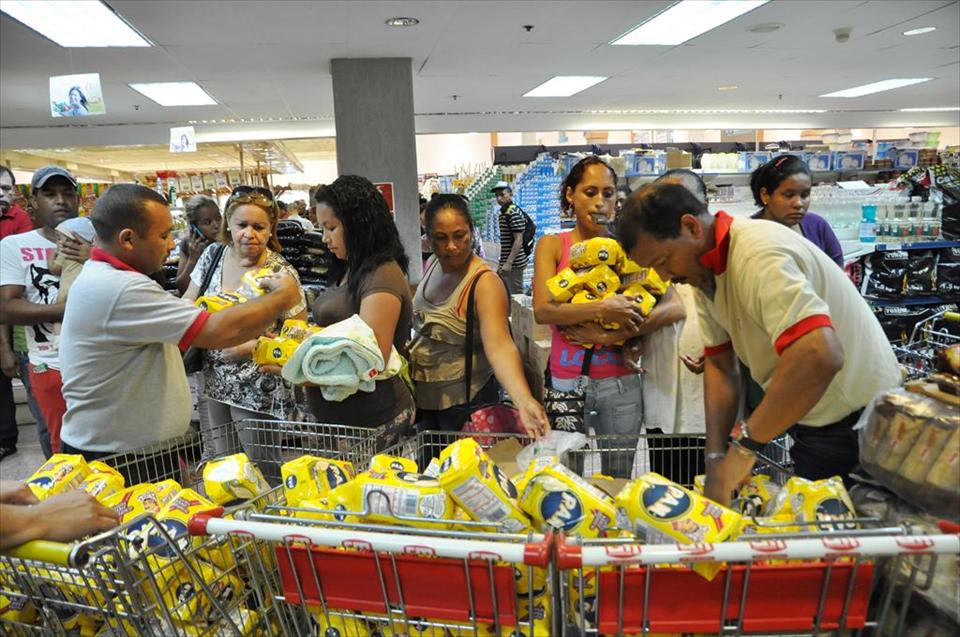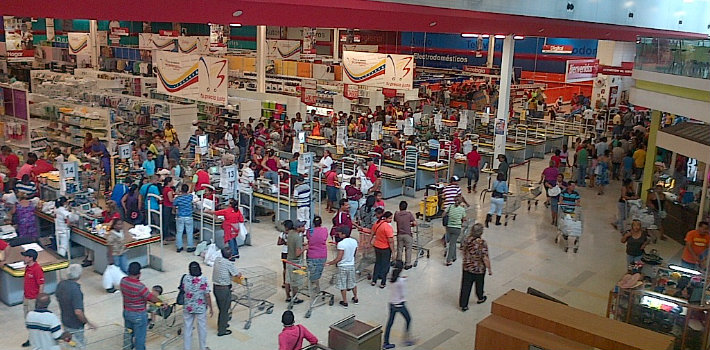EspañolOn Saturday, Venezuelan President Nicolás Maduro announced the creation of a “superior system” of supply to combat the suspicion that, according to the president, people are “taking advantage” of programs that offer subsidized products to the public. The new system will employ an electronic banking card, “secure digitized supply system,” that will be provided to all who receive government assistance (Bicentenario, PDVAL, Mercal) and will serve to limit purchases of specific products.
Maduro’s decision stems from the problems associated with these government-run markets, under the umbrella of the Misión Alimentación (Food Mission), that sell food and staple products subsidized by the government — although food shortages have been just as evident in private supermarkets as well. Last week, PDVAL announced the start of a pilot program in which users can only purchase certain products once a week, and to maintain control, will register using their ID number before making their purchases.
The Worsening Shortage Problem
The primary objective of the food program, established by Hugo Chávez in 2003, has been to distribute and sell food and other basic necessities at lower prices than private businesses. However, the program has run into two major problems: (1) government markets have become the ideal place for informal traders, known as bachaqueros, to acquire merchandise at low prices for resale at much higher prices; (2) shortages on certain basic products continue to occur because, on the occasion that they can be found, they are bought in very large quantities for fear they will not be found in the future.

The government has classified this sort of behavior as “domestic hoarding,” or nervous shopping, and has identified it as the principal cause of shortages.
“If … people are going take 20 packages of flour when they would normally take three, they are creating a logistical gap that there is no way to cover. It is a call to conscience on the issue of nervous purchases and domestic hoarding that is effectively causing us all harm,” explained Félix Osorio, Minister of Nutrition.
Edgar Díaz, an economist and university professor in Caracas, offers an explanation to better understand the behavior of Venezuelan consumers with respect to regulated products and those that are more scarce.
“When the consumer market does not see any regularity in supply, consumers will see this trend and buy more than they need. On the other hand, while a wide price gap exists ‘through subsidies,’ the bachaquero market will continue to exist and there is no way to control it.”
Long lines at both government-run and private supermarkets to acquire a limited number of basic products are becoming more frequent every day. Given this “distortion” of the program, the government has tried various means of controlling “excessive” purchases. Identifying consumers and limiting their purchases has been the first step in countering the “compulsive shopping” that worries the Venezuelan government.

The Ration Card as a Solution to the Shortages
In a country with strong currency controls, and where inflation in 2013 reached an official rate of 56 percent, the product shortage has become the main issue that has confronted the government of Nicolás Maduro. According to a January 2014 report by the Venezuelan Central Bank, the scarcity index reached 28 percent, meaning 28 of every 100 products measured were not available and had no substitute.
Maduro has publicly condemned what he considers an “economic war” being waged by his political opposition and capitalists, who are the purported reason Venezuelans cannot obtain basic goods. As a result, the president has decided to fight this battle using both the Law of Fair Costs and Prices, which restricts businesses income to 30 percent, and the new “secure digitized supply system,” which will limit the purchase of basic goods at government markets.
However, the adoption of these methods indicates a change in Maduro, who previously rejected any efforts to introduce a food ration system, calling it “crazy.” On state television network Venezuelan of Television in June of last year, the president stated that “the solution to our economic problems and over-consumption … is to produce, produce, produce, in good faith towards the consumption of the Venezuelan family.” He went on to say that if in any part of the country a plan were in place to ration the sale of food, it was “ordered to terminate.”
Regarding this change in strategy, the economist Díaz tells us that “the president decided to push the measures now because scarcity has increased and will continue to rise.” While these measures are intended to put an end to the food shortage and speculation, Díaz disagrees that it will accomplish its intended goal.
“On the contrary, it will intensify,” he said. “They are trying to put out a fire with gasoline. While they maintain price controls and the rationing of preferential dollars, they are discouraging domestic production. Neither the private sector nor the government can keep pace with supply because there is insufficient foreign currency to adequately stock the productive sector.”
Díaz believes that the solution to the shortage is far from applying greater controls on the economy. However, lifting restrictions would imply a political cost too great for Maduro to absorb. The economist explains that “the problem of shortages will be resolved by injecting foreign currency into the economy and gradually freeing price controls and other restrictive elements. While this may trigger inflation, they are unpleasant measures that the government will eventually have to take.”
Translated by Guillermo Jimenez.
 Versión Español
Versión Español












